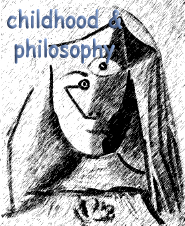childhood, impulse and creative becoming. nietzschean approaches
DOI:
https://doi.org/10.12957/childphilo.2020.48342Keywords:
nietzsche, childhood, the will to power, vitalism.Abstract
In Nietzschean thought there is a permanent tension between culture and life; both move, many times, in contradictory directions. According to Nietzsche, culture always wins, because it has the Apollonian dimension on its part, that is, that defined, clear, refined way in which it is expressed, understands and transmits what is narrated. The beautiful form is just a way of appearing from the deeply transcendental; it is the tip of a gigantic iceberg called life. Nietzsche is a vitalist thinker, committed to human expression, consisting of wanting, for love of oneself, the same thing that life wants, that is, directing its actions toward the suspension of judgments about the most convenient, most appropriate, politically correct, forms of cutural life. Childhood has an abundance of life pushing to get out--it is the Dionysian latency that does not want to succumb to the Apollonian commitment; it is life without a name, the force that devastates the encystment of form. It is life and childhood in tension, a childhood we think we know and at the same time a childhood that will never match those names we give it. Frequently the impulse for capture and closure mobilizes our adult interest, we approach childhood by naming and assigning roles, we are shaping the account we give of it. The impulse is converted into a pulse, a cadence, a recording, a ticking; Cronos appears, being acquires a permanent form, becoming gradually fades away.
Downloads
References
CARRASCO, E., El pensamiento dionisíaco, Revista de Filosofía Universidad de Chile, Vol. LV-LVI, 17-38, 2000
ESCRÍBAR, A., Nietzsche: la vida como Fundamento del valor, Santiago, Chile, Publicaciones Especiales Facultad de Filosofía y Humanidades, Universidad de Chile, 1982
FOUCAULT, M., El orden del discurso, Buenos Aires, Argentina, Tusquets Editores, 1992
NIETZSCHE, F., Así habló Zaratustra, Madrid, España, Editorial Alianza, 2000
NIETZSCHE, F., Genealogía de la Moral, Madrid, España, Editorial Alianza, 1991
NIETZSCHE, F., La Voluntad de Poder, Buenos Aires, Argentina, Editorial Poseidón, 1947
MACINTYRE, A., Tras la virtud, Barcelona, España, Editorial Crítica, 2004
RANCIÈRE, J., El reparto de lo sensible: Estética y política, Santiago de Chile, LOM Ediciones, 2009




